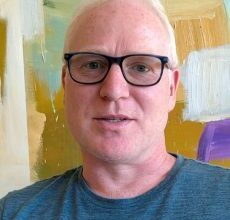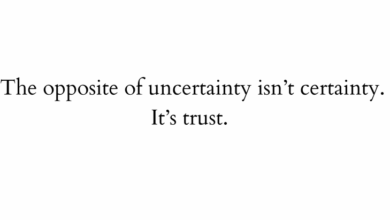When Love Isn’t Enough: How I Found Healing After Emotional Abuse


Want more posts like this in your life? Join the Tiny Buddha list for daily or weekly insights.
“You can’t save someone who isn’t willing to participate in their own rescue.” ~Unknown
You and I have been doing the work. Talking. Writing. Processing.
Everything I’m focused on right now—in my healing, in my spirit, in my writing—is love. Becoming love. Living in love. Returning to love.
And yet, there’s a chapter of my life that continues to whisper to me: Why wasn’t love enough?
I spent nine years in a relationship that left me anxious, confused, and small. I was always on edge. Walking on eggshells, never knowing whether I’d be met with affection or fury. He could be charming one moment and cruel the next. A Jekyll-and-Hyde personality I came to normalize.
I stayed longer than I like to admit because I believed, deep down, that my love could heal him. If I just loved harder, more purely, more selflessly, maybe I could soften his edges. Diminish the rage. Make him whole.
But no matter how hard I tried, it didn’t work.
He still raged. He still criticized. He still looked at me like I was the problem.
Eventually, I had to face a truth I never wanted to admit: Love, at least mine alone, wasn’t enough to change him.
The Lie We’re Told About Love
So many of us are raised on the idea that love conquers all. That it’s our job to be patient, forgiving, and understanding. That if we just hold space long enough, people will change. Heal. Transform.
But here’s what I’ve learned the hard way:
- Love only transforms when both people are willing participants in healing.
- Love cannot live where there is no safety.
- It cannot grow in an environment ruled by control or fear.
- And it cannot thrive when one person is constantly shrinking just to survive.
The Roadblocks to Leaving
Leaving was complicated. We didn’t live in a bubble. There were family, friends, colleagues, and the church, each with strong opinions.
“God hates divorce.” That was the message drilled into me. Sometimes in whispers. Sometimes in shouts.
In the church, women are told to submit. But submission, to me, always meant a mutual dance. A respectful exchange of give and take, compromise, and safety. Not suppression. Years later, I finally heard the words “submission without suppression,” and something clicked.
Another moment of clarity came when I heard: God cares more about the human in the relationship than He does about the institution of marriage. That truth was liberating. It helped me accept that even if I wasn’t being physically abused, I was still being harmed in ways that mattered.
At the time, I thought I was in a crisis of faith. But my soul knew better: it wasn’t faith that was broken. It was people. My spirit whispered that the path forward wasn’t in saving the marriage.
It was in saving myself.
The Cost of Leaving
Leaving wasn’t just about walking away from one man. It meant losing entire circles of connection.
My ex’s family had been part of my daily rhythm with shared meals, holiday gatherings, and weekend adventures. That familiar pattern disappeared overnight.
Even friendships I thought were my own slipped away. Some didn’t understand my choice. Others quietly withdrew, perhaps uncomfortable with divorce itself, or perhaps with me choosing a new path. I’ll never know for sure.
The losses were painful. I had to sit with the ache, mourn the empty spaces, grieve the old circle. But slowly I began to see: some people are only meant to walk with us for a season. Growth means outgrowing certain spaces and opening to new ones.
Healing came with the release of those no longer meant for me, so I could make room for the ones who were.
What I Know Now
It took years—and therapy, journaling, truth-telling, and self-forgiveness—to admit that I wasn’t weak for staying. I was loving. I was loyal. I was trying.
But the love I gave wasn’t being received. It wasn’t reciprocated. And it wasn’t respected.
Here’s the radical truth I finally embraced:
My love was never the problem. It was real. It was whole. It was enough.
But it could never replace the work someone else refused to do.
Leaving Comes in Bursts and Choices
Leaving doesn’t happen all at once. It comes in bursts and choices.
There was the physical leaving, which involved moving out of our home and subletting a college apartment that no thirty-six-year-old should have to reside in.
And then came the months of separation and eventually divorce—difficult conversations, compromises, and grief. Along the way, a new friendship was strengthening and shifting.
From the day I met Jim, I was drawn in by his smile, his laugh, his kindness. Over time, a deep trust and mutual respect developed. As the distance between my ex and me grew, Jim and I grew closer. We came to a crossroads, another choice.
The New Love I Choose
When I first left, I clung to the idea of remaining friends with my ex. Coffee together. Kind words. Civility. But I quickly realized two things: first, that wasn’t in his nature. And second, it wasn’t fair to Jim.
Jim listened patiently as my ex talked about “winning me back.” Then, with kindness and clarity, Jim said, “You need to choose, because I’m not going to stay in limbo while you figure things out.”
It wasn’t an ultimatum meant to control me. It was a boundary meant to protect his heart. And in that moment, I felt the difference between destructive love and healthy love.
Healthy love stands firm without hostility. It respects both people. It asks for clarity, not chaos.
Today, my life looks radically different. I’m in a partnership built on respect, kindness, trust, and healing.
A relationship where I feel safe, seen, and loved without having to earn it.
And yet, sometimes I still look back. Not with longing but with tenderness for the woman who stayed.
The woman who tried. Who hoped. Who believed love could fix what was broken.
To her, I say:
You were doing your best with what you knew at the time. It’s okay that you thought love could be enough. It’s okay that you tried. And it’s beautiful that you eventually walked away.
If You’re There Now
If you’re in a relationship where love feels like walking on eggshells, where you’re exhausted from trying to be “enough,” hear this:
- You don’t have to fix anyone.
- You don’t have to stay to prove your love.
- You are not the reason they’re angry, critical, or cruel.
You are allowed to leave in the name of love. Especially the love you owe yourself.
And if you’re in the messy middle, give yourself grace. Know this: it’s okay to love again and still feel trauma. To still get triggered. To mourn, rage, regret.
It’s okay to cry, even when you’ve moved on and built a healthier life. Tears are part of release, part of healing, part of love finding its way back to you.
About Lori Ann King
Lori Ann King is a writer, wellness warrior, and truth-teller who explores healing, freedom, and joy through words. She is the author of Come Back Strong and a two-time contributor to the Chicken Soup for the Soul series. She writes at LoriAnnKing.com.




